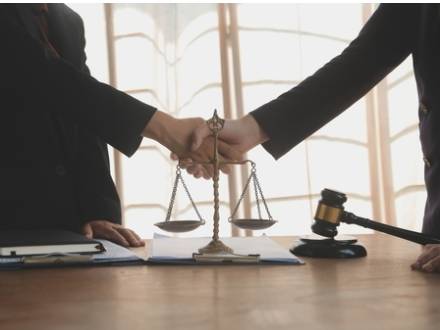Recent Blog Posts
When Chapter 7 Leaves Friends or Family Co-signers on the Hook
 Perhaps you are considering filing for bankruptcy and are wondering how it may affect someone who co-signed a loan for you. Or, maybe you are the cosigner and have just discovered that the person you co-signed a loan for is filing for Chapter 7 bankruptcy.
Perhaps you are considering filing for bankruptcy and are wondering how it may affect someone who co-signed a loan for you. Or, maybe you are the cosigner and have just discovered that the person you co-signed a loan for is filing for Chapter 7 bankruptcy.
How does a bankruptcy filing affect a co-signer – or does it? While filing for Chapter 7 bankruptcy in Maryland can wipe out overwhelming personal debt, giving an individual a fresh financial start, when loans are co-signed, the consequences can go far beyond those to the debtor.
It is essential that both the debtor and the cosigner understand their positions in the event that Chapter 7 bankruptcy is filed. While Chapter 7 can erase the debtor’s liability, it may not automatically release the financial responsibility of a cosigner. Before making any financial or legal decisions regarding Chapter 7 bankruptcy, speak to a knowledgeable Hyattsville, MD bankruptcy lawyer.
Chapter 13 in Maryland: Is Social Security Income Enough?
 Filing for Chapter 13 bankruptcy in Maryland can help you protect important assets and reorganize your debts. Only those with a steady income and the ability to make consistent monthly payments will qualify for Chapter 13. But what if Social Security is your only source of income? Could you still qualify under Chapter 13 bankruptcy requirements?
Filing for Chapter 13 bankruptcy in Maryland can help you protect important assets and reorganize your debts. Only those with a steady income and the ability to make consistent monthly payments will qualify for Chapter 13. But what if Social Security is your only source of income? Could you still qualify under Chapter 13 bankruptcy requirements?
The short answer to this question is that while Social Security income is protected from creditors and generally excluded from the bankruptcy means test, it can still be used to fund a Chapter 13 plan in many cases. Perhaps you have questions regarding whether Chapter 13 (RULE 3015-1) bankruptcy is right for you and whether it can be funded with your monthly Social Security check. Consulting with an experienced Takoma Park, MD bankruptcy attorney can ensure you are on the right track.
How a Business Owner Files for Personal Bankruptcy in Maryland
 Far from making you immune to financial struggles, owning a small business can result in mounting debts that spill over into your personal life. If you have signed personal guarantees or mixed business and personal finances, the likelihood of this occurring increases significantly. If you are overwhelmed by credit card debt, medical debt, or business-related liabilities, you could potentially find relief by filing for personal bankruptcy.
Far from making you immune to financial struggles, owning a small business can result in mounting debts that spill over into your personal life. If you have signed personal guarantees or mixed business and personal finances, the likelihood of this occurring increases significantly. If you are overwhelmed by credit card debt, medical debt, or business-related liabilities, you could potentially find relief by filing for personal bankruptcy.
The process can be complex when you are trying to keep your business afloat. If you are a Maryland business owner, it is essential that you have accurate information in order to make a smart decision regarding filing for personal bankruptcy without risking everything you have worked for. Now is the time to speak to a knowledgeable College Park, MD bankruptcy attorney.
What is the Difference Between Personal and Business Bankruptcy?
Personal bankruptcy provides individuals with a fresh financial start by either discharging or reorganizing their debts. Personal bankruptcy involves personal assets, and state-specific exemptions determine which assets are protected from creditors. Individuals file under Chapter 7 (liquidation) or Chapter 13 (repayment plan).
What Is the Brunner Test?
 Student loans are a significant source of debt for many Americans. If you have a great deal of student loan debt you may be wondering whether it can be discharged in bankruptcy. While student loans are among the most difficult debts to discharge in bankruptcy, it is still possible to discharge student loans in some cases. Most courts use the Brunner Test, a legal test that was developed in case law, to determine whether student loans are dischargeable in a given case. An experienced Greenbelt, MD bankruptcy attorney can represent you in bankruptcy and help you discharge student loan debt.
Student loans are a significant source of debt for many Americans. If you have a great deal of student loan debt you may be wondering whether it can be discharged in bankruptcy. While student loans are among the most difficult debts to discharge in bankruptcy, it is still possible to discharge student loans in some cases. Most courts use the Brunner Test, a legal test that was developed in case law, to determine whether student loans are dischargeable in a given case. An experienced Greenbelt, MD bankruptcy attorney can represent you in bankruptcy and help you discharge student loan debt.
Are Student Loans Dischargeable in Bankruptcy?
Unlike credit cards, medical bills, and most other unsecured debts that are eliminated in bankruptcy, discharging student loans in bankruptcy is not easy. They typically survive bankruptcy proceedings and continue to follow borrowers even after they receive a discharge of their other debts.
Can Medical Debt Be Discharged in Bankruptcy?
 Between sky-high health insurance costs, deductibles, and unforeseen charges, medical care costs can really add up. And if you have to face an unforeseen medical emergency or serious illness, those costs can get even higher. The result is that many people rack up considerable medical debt. The good news is that Chapter 7 bankruptcy can discharge many types of medical debt. This type of debt is such a common reason that people file for bankruptcy—an estimated 66.5 percent of all consumer bankruptcies, according to the Consumer Financial Protection Bureau (CFPB)—that there is even a term for it: medical bankruptcy. An experienced Greenbelt, MD medical debt and bankruptcy attorney can advise you on whether filing for bankruptcy to discharge your medical debts can be the best option for you.
Between sky-high health insurance costs, deductibles, and unforeseen charges, medical care costs can really add up. And if you have to face an unforeseen medical emergency or serious illness, those costs can get even higher. The result is that many people rack up considerable medical debt. The good news is that Chapter 7 bankruptcy can discharge many types of medical debt. This type of debt is such a common reason that people file for bankruptcy—an estimated 66.5 percent of all consumer bankruptcies, according to the Consumer Financial Protection Bureau (CFPB)—that there is even a term for it: medical bankruptcy. An experienced Greenbelt, MD medical debt and bankruptcy attorney can advise you on whether filing for bankruptcy to discharge your medical debts can be the best option for you.
Choosing Between a Chapter 7 or Chapter 13 Bankruptcy
 For the average person, Chapter 7 and Chapter 13 are the most likely bankruptcy options when looking for debt relief. As you navigate your choices, knowing about the pros and cons of both will help you make an informed decision about your financial future. If you have questions or concerns, a Prince George’s County, MD bankruptcy attorney can offer advice rooted in experience.
For the average person, Chapter 7 and Chapter 13 are the most likely bankruptcy options when looking for debt relief. As you navigate your choices, knowing about the pros and cons of both will help you make an informed decision about your financial future. If you have questions or concerns, a Prince George’s County, MD bankruptcy attorney can offer advice rooted in experience.
Definitions of Chapter 7 and Chapter 13 Bankruptcy
Chapter 7 bankruptcy is commonly called liquidation bankruptcy because it allows you to give up property to pay debts while protecting certain assets. For example, some Chapter 7 exemptions include qualified retirement plans and social security benefits. People often wonder if they can keep their home, and in many cases, they can. Exemptions typically include protections for home equity.
Chapter 13 bankruptcy is more of a plan designed to help you pay off your debts in smaller amounts. The terms include an end date, and when it concludes, the debt that remains is wiped away.
When Is Chapter 7 Bankruptcy a Good Idea For Senior Citizens?
 Sometimes life throws you curveballs, and even the most well-intentioned plans can be sidetracked. If you are a senior citizen, you may be facing significant debt and financial difficulties at a time when you likely envisioned yourself retiring. You may even be contemplating bankruptcy.
Sometimes life throws you curveballs, and even the most well-intentioned plans can be sidetracked. If you are a senior citizen, you may be facing significant debt and financial difficulties at a time when you likely envisioned yourself retiring. You may even be contemplating bankruptcy.
Yet it is not all bad news. First of all, it is common to face serious financial difficulties later in life due to unexpected events like an illness. Most importantly, in some cases, Chapter 7 bankruptcy can actually provide significant benefits to senior citizens. An experienced Greenbelt, MD bankruptcy attorney can advise you if bankruptcy is right for you,
When Might Bankruptcy Be a Good Option for Seniors?
To determine whether filing for bankruptcy is the right option for you, you should consider your current financial situation, primarily the types of debts and assets that you have:
Four Bankruptcy Myths Debunked
 Sometimes, individuals who might benefit from the bankruptcy process put off filing for bankruptcy due to concerns that it might ruin their credit or that filing for bankruptcy is equivalent to admitting personal and financial failure. This is understandable, but the reality is that bankruptcy can actually be a solid way to get your finances in order and move forward with a clean slate.
Sometimes, individuals who might benefit from the bankruptcy process put off filing for bankruptcy due to concerns that it might ruin their credit or that filing for bankruptcy is equivalent to admitting personal and financial failure. This is understandable, but the reality is that bankruptcy can actually be a solid way to get your finances in order and move forward with a clean slate.
Learning more about how bankruptcy really works and how it could affect you can provide certainty and peace of mind about the process. An experienced Maryland bankruptcy attorney can advise you on the myths surrounding bankruptcy, debunk these myths, and let you know whether bankruptcy is right for you.
Myth 1: You Will Lose Your Home in Bankruptcy
Bankruptcy does not have to mean that you will lose your home. In Chapter 7 bankruptcy, certain assets are exempt from the bankruptcy estate, meaning that you can keep these assets. Maryland has a homestead exemption for bankruptcy of $27,900 in 2025, meaning that the exemption protects up to this amount of equity in your primary residence from becoming part of the bankruptcy estate. In addition, exemption amounts for other types of property can be added to this amount.
Should You Get a Loan Modification?
 It is stressful to face the potential foreclosure of your home. Yet there are practical solutions to avoid foreclosure. Even before thinking about a more significant step like filing for bankruptcy, one way to avoid foreclosure is by negotiating a loan modification with the bank.
It is stressful to face the potential foreclosure of your home. Yet there are practical solutions to avoid foreclosure. Even before thinking about a more significant step like filing for bankruptcy, one way to avoid foreclosure is by negotiating a loan modification with the bank.
Foreclosures are inconvenient and expensive for banks, which is why banks sometimes have an incentive to negotiate a financial solution that works for you to repay your loan. An experienced Greenbelt, MD foreclosure defense attorney can assist you with your loan modification.
What Is Mortgage Loan Modification?
A loan modification is a long-term mortgage relief option for borrowers. It is an opportunity to renegotiate the terms of their mortgage loan to make the payments more manageable. A loan modification lowers monthly payments by reducing the interest rate, reducing the principal balance, or changing the loan term. If approved by the lender, a loan modification is a good way to avoid foreclosure.
Reaffirmation Agreements in Chapter 7 Bankruptcy
 If you have filed for Chapter 7 bankruptcy, your nonexempt assets will be liquidated during the bankruptcy. But what if you wish to keep a certain asset even though it would normally be liquidated as part of the bankruptcy estate? In certain cases you may be able to do so by entering into a reaffirmation agreement with your creditor. In fact, sometimes a lender will ask you to sign a reaffirmation agreement. An experienced Maryland bankruptcy attorney can advise you on whether a reaffirmation agreement is the right option for you.
If you have filed for Chapter 7 bankruptcy, your nonexempt assets will be liquidated during the bankruptcy. But what if you wish to keep a certain asset even though it would normally be liquidated as part of the bankruptcy estate? In certain cases you may be able to do so by entering into a reaffirmation agreement with your creditor. In fact, sometimes a lender will ask you to sign a reaffirmation agreement. An experienced Maryland bankruptcy attorney can advise you on whether a reaffirmation agreement is the right option for you.
What Is a Reaffirmation Agreement and Why Sign It?
A reaffirmation agreement is a contract between you and a creditor entered into during Chapter 7 bankruptcy in which you agree to keep a certain asset out of bankruptcy by affirming the obligation to pay. Practically speaking, the asset will not be liquidated in bankruptcy and the debt will not be discharged. You will continue paying the debt and remain liable for the unpaid balance.






